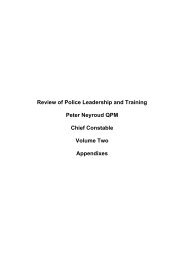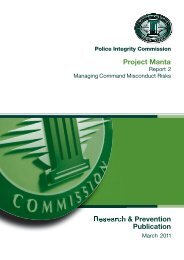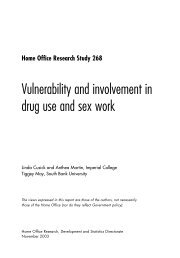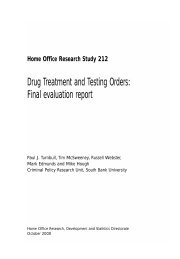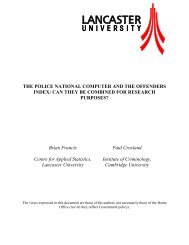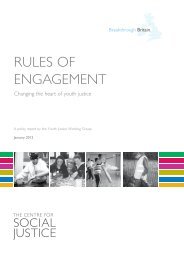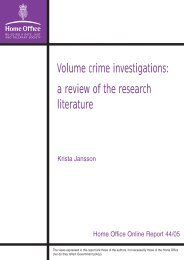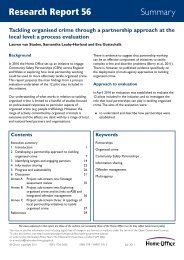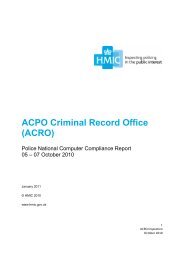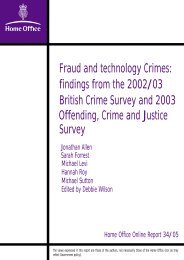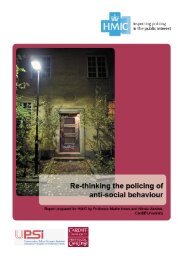Policing Large Scale Disorder: Lessons from the disturbances of ...
Policing Large Scale Disorder: Lessons from the disturbances of ...
Policing Large Scale Disorder: Lessons from the disturbances of ...
Create successful ePaper yourself
Turn your PDF publications into a flip-book with our unique Google optimized e-Paper software.
Home Affairs Committee: Evidence Ev w67<br />
We beg <strong>the</strong> question—are <strong>the</strong> 48% <strong>of</strong> unemployed young black people to be regarded as surplus to<br />
requirement?<br />
More generally, as Wilkinson and Pickett (2009) point out in <strong>the</strong> “Spirit Level”, 66 phenomena usually<br />
described as “social problems” (crime, social unrest, ill-health, etc) are far more common in unequal societies<br />
than ones with better economic distribution. Within <strong>the</strong> UK, it would appear that young black people are<br />
destined to be at <strong>the</strong> sharper end <strong>of</strong> <strong>the</strong> growing inequality that affects <strong>the</strong> country.<br />
Education<br />
We are aware <strong>of</strong> <strong>the</strong> prominence that education is frequently given as being <strong>the</strong> major route for social<br />
mobility/social/economic advancement. As noted above, although <strong>the</strong> experience <strong>of</strong> black children <strong>of</strong> <strong>the</strong><br />
education system remains precarious, it is a recognition that education plays a pivotal role in <strong>the</strong> lives <strong>of</strong> black<br />
communities—in its essential aspect in fighting discrimination and establishing <strong>the</strong> Black communities in long<br />
term employment and enabling <strong>the</strong>m to contribute to society.<br />
It is a recognised statistic that a number <strong>of</strong> black children, especially boys, underperform disproportionately<br />
at GCSE level even though <strong>the</strong>y excel at <strong>the</strong> age <strong>of</strong> five. This situation is compounded by <strong>the</strong> high level <strong>of</strong><br />
black pupils excluded <strong>from</strong> school. For instance, <strong>the</strong> evidence suggests that <strong>the</strong>y are ten times more likely to<br />
be excluded than <strong>the</strong>ir white peers. The fact that <strong>the</strong>re are more black males in prison than at university in<br />
England should be a cause for concern and action. Also, <strong>the</strong> disproportionate number <strong>of</strong> black students at new<br />
universities compared to <strong>the</strong> elite Russell group universities should be <strong>of</strong> concern for action.<br />
What is it that causes this decline in performance and what policy changes would ameliorate this disturbing<br />
trend? It is such questions (and o<strong>the</strong>rs) that policy makers need to address if we are to dismantle <strong>the</strong> barriers<br />
which blight <strong>the</strong> lives <strong>of</strong> young black people.<br />
Way Forward<br />
There are no easy solutions to tackling <strong>the</strong> embedded structural inequality which engulf <strong>the</strong> lives <strong>of</strong> young<br />
black people. Possible areas <strong>of</strong> focus could include:<br />
Establishing a Young People Commission<br />
We propose <strong>the</strong> establishment <strong>of</strong> a Commission or an equivalent body to oversee <strong>the</strong> affairs <strong>of</strong> young people<br />
(16–25). The Commission would attend to all aspects <strong>of</strong> young people’s lives, including areas <strong>of</strong> structural,<br />
social, ethnic barriers, intergenerational conflict and leisure opportunities.<br />
Partnership Working with Community Organisations<br />
Regional/local priorities should include working with community based organisations in tackling<br />
marginalisation and accompanying alienation amongst young people. This should include resourcing<br />
“successful” organisations in order to assure <strong>the</strong> sustainability to deliver on <strong>the</strong>ir missions to create public<br />
good, as part <strong>of</strong> providing <strong>the</strong> “big society plan”.<br />
Giving Young People a Voice<br />
The need for a concerted attempt to ensure that <strong>the</strong> “voice” <strong>of</strong> young people informs aspects <strong>of</strong> policy<br />
making and practice relating to young people’s affairs eg in advancing policy and practice through establishing<br />
dialogues between young people, policy makers and practitioners via discussion forums, policy briefing, <strong>the</strong><br />
proposed “Young people Commission” etc.<br />
September 2011<br />
Written evidence submitted by <strong>the</strong> Association <strong>of</strong> Police Authorities<br />
The Association <strong>of</strong> Police Authorities (APA) represents police authorities in England, Wales and Nor<strong>the</strong>rn<br />
Ireland. It has two main functions: to act as <strong>the</strong> national voice <strong>of</strong> police authorities and influence <strong>the</strong> national<br />
agenda on <strong>the</strong>ir behalf; and to help police authorities do <strong>the</strong>ir job locally through <strong>the</strong> development <strong>of</strong> guidance<br />
and advice on national policing, criminal justice and community safety related issues.<br />
Executive Summary<br />
1. The APA welcomes <strong>the</strong> Home Affairs Select Committee (HASC) inquiry, commends <strong>the</strong> response <strong>of</strong> <strong>the</strong><br />
police service to <strong>the</strong> unprecedented events witnessed in August and would highlight <strong>the</strong> following points:<br />
(a) Contrary to <strong>the</strong> assertion <strong>of</strong> <strong>the</strong> Home Secretary police authority members, both during and after <strong>the</strong><br />
recent <strong>disturbances</strong>, were actively reassuring communities and supporting Chief Constables and<br />
police <strong>of</strong>ficers, thought out <strong>of</strong> <strong>the</strong> media spotlight.<br />
66 Wilkinson, R, Pickett, K (2009). “The Spirit Level: Why more equal societies almost always do better”



